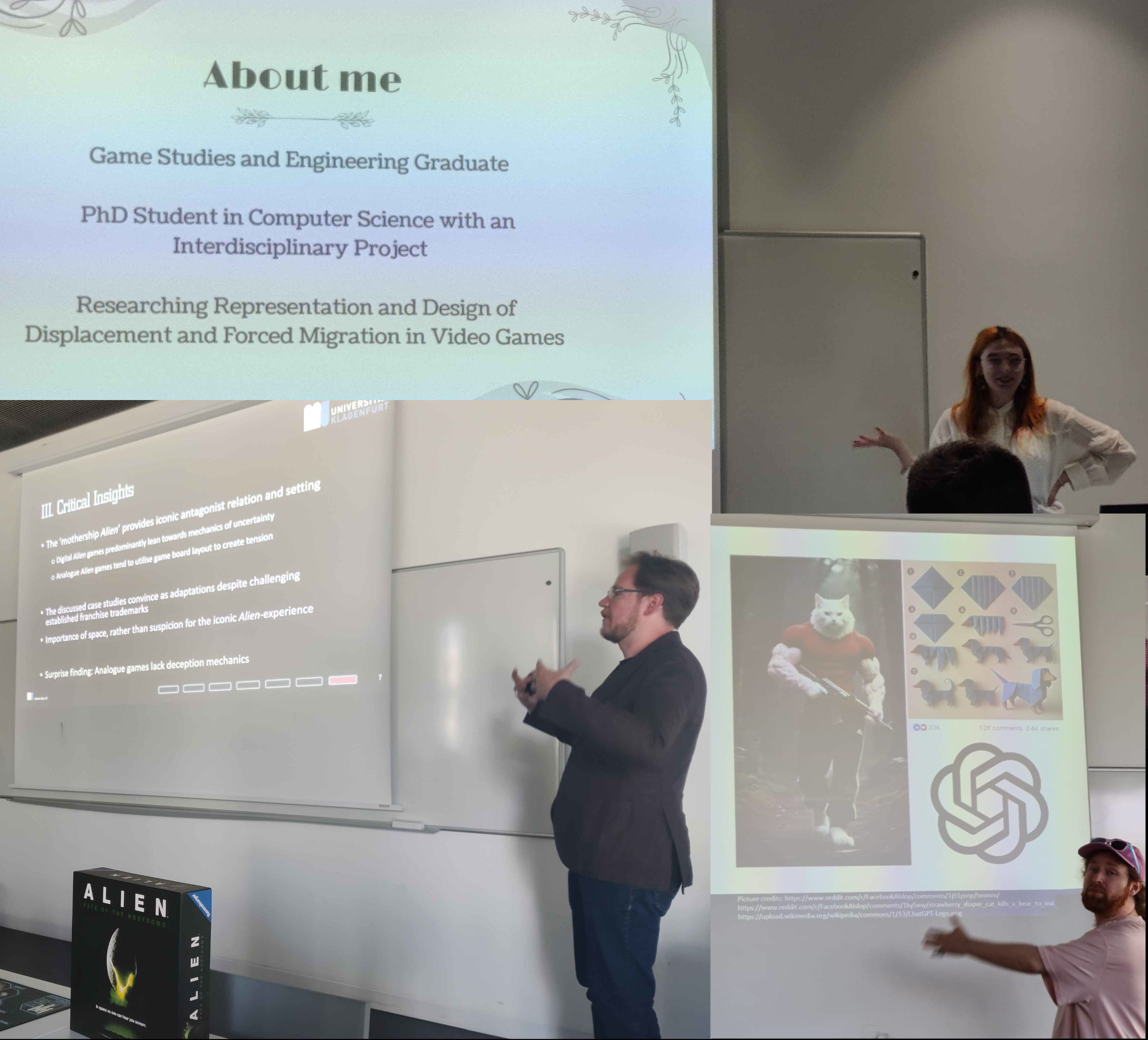Video Game Cultures 2025
Kseniia, Felix, and Tom at Video Game Cultures 2025
Prague, Czech Republic, 10-12th September 2025
Kseniia, Felix, and Tom presented at the VGC 2025 in Prague. This academic research conference dealing with video games from a variety of different angles was also held in Klagenfurt two years ago, and is likely to be hosted here again in the near future.
Author: Kseniia Harshina
Title: Traces of Memory, Traces of Home: Trauma-Aware Environmental Storytelling in Games
Abstract: This presentation explores how game environments can function as emotional architectures, spaces that do not just represent trauma, but embody it. In particular, I examine how digital environments can reflect fractured relationships to memory, identity, and home. I propose a twofold approach: a critical reading of trauma in environmental storytelling, and a participatory design method grounded in co-creation and lived experience.
First, I examine how games such as Silent Hill 2 use space to externalize grief, memory, and emotional fragmentation. These environments are not just settings, they are structured by loss. They invite players to navigate emotional landscapes through movement and embodiment, instead of exposition.
Second, I reflect on my research-creation work with people who have experienced forced migration, in which we co-design adaptive environments that shift in response to memory, emotion, and identity. I would like to introduce a dual-role framework: Survivors, who shape and embed memory traces into environments; and Witnesses, who explore these spaces with limited agency. This distinction reflects different relationships to trauma: those who have lived it, and those invited to listen. This model invites reflection on authorship, the emotional labor of sharing trauma, and the ethics of game design. It also challenges dominant design assumptions, suggesting that withholding agency can be a powerful act of care. This work argues that trauma-aware environmental storytelling offers a way to reimagine home, not as a static setting, but as a shifting, layered space where pain and longing coexist.
Ultimately, this approach makes space for grief and displacement not just thematically, but architecturally. What remains are not just spaces, but traces, of memory, of home, of stories that ask us to listen more deeply to others, and to the pasts we carry with us.
Author: Felix Schniz
Title: In Cardboard Space, No One Can Hear Your Scream The Alien Universe Between Digital and Analogue Game Experiences
Abstract: The science-fiction horror that began with Alien (Scott 1979) has long since evolved into a transmedia universe spanning a diverse set of media artefacts (cf. Heinze 2019). Its unique selling points – dark, confined environments and the clearly defined protagonist/antagonist conflict of alien Xenomorphs and human Colonial Marines taking place within them – make the setting an especially favourable topic for game adaptations. Intense digital survival horror games, such as Alien: Isolation (Creative Assembly 2014), have received a fair share of
academic attention in game studies (cf. Švelch 2020). Analogue Alien games and their unique mechanic potential on environmental storytelling, however, yet deserve more attention. In my talk, I focus on the analogue interpretations of the Alien universe and how they differ from the digital. I identify the opportunities and demands of digital and analogue game spaces that capture the essential experience the universe provides – a storytelling world deeply laden with political, gothic, and evolutionary horrors – and illustrate their manifestation in twodimensional cardboard and table spaces.
After introducing the universe and the parameters for game design set by its pivotal spaces, I establish a dialogue between spaces of play and represented spaces. Relying on the foundational works on transmedia adaption theories (cf. Hutcheon 2006 and Rauscher 2012), cross-sectioning them with environmental storytelling concepts (cf. Rauscher 2015) and a look at horror in gaming (Perron 2018), I provide an overview of key Alien game adaptations, analysing how said parameters define game mechanics. I focus on the differences in how digital
interfaces and systems, as seen in video games such as the already mentioned Alien: Isolation or the recent Aliens: Dark Descent (Tindalos Interactive 2023), compare to the material and social interactions demanded by analogue forms. These observations include rarely discussed works such as the Aliens Predator Customizable Card Game (Ackels et al. 1997), the tabletop war game Aliens Vs Predator: The Hunt Begins (Ewertowski and Olesky 2015), and the board game Aliens: Another Glorious Day in the Corps (Haught 2020).
My outcome is a nuanced understanding of how analogue games adapt an established cinematic universe/environmental storytelling world, revealing specific design strategies employed to evoke shared yet medium-specific, universe-encapsulating space. I ultimately offer insights for debate into the mechanic translation required for cross-platform IP adaptation.
Author: Tom Tuček
Title: The Costs of Generative AI in Video Games: Using Locally-Running Models for Sustainability
Abstract: Generative AI is reshaping video game worlds by providing developers and designers with quick and easy access to assets, as well as by allowing for the dynamic creation of environments, dialogue, and narrative during gameplay. While generative AI brings increased potential for creativity and accessibility, it also brings many new issues and questions. We highlight the ethical implications and problems of AI-native games (video games using real-time generative AI as a core part of their design) by focusing on their environmental impact.
Following a short discussion on the ethics of generative AI, we frame the topic within the ongoing climate crisis and investigate the energy demands of models used for and within video games. By comparing the costs of various approaches, we highlight the potential for the use of smaller models in video games, which can run on local end-user machines, such as PCs or game consoles, while using less power. This approach also helps with other issues, such as online dependency and data privacy.
To ground these arguments, we present a case study of our game, One Spell Fits All, an AI-native video game prototype that runs offline on consumer laptops. Preliminary findings show the potential of this approach, showcasing reduced energy consumption while maintaining a high-quality game experience.
Based on these critiques and findings, we propose guidelines for more responsible AI-native video game design, such as prioritizing low-power models and client-side inference, selecting appropriate models for each task, and monitoring the energy consumption of games during the development process.
By looking at AI-native games through the lens of climate ethics, this work contributes to our understanding of the novel field of generative AI in games while also offering best practice approaches for designers, developers, and players committed to greener virtual worlds.

